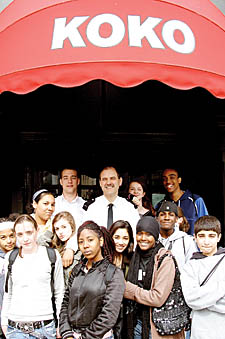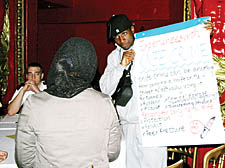|
|
 |
| |

Pupils from Hampstead School pose with two police officers who are based in Camden Schools outside the club

A pupil holds up notes from his group’s discussion on Experiences with Knife Crime |
Youngsters reveal knife and gang culture is rife
Students speak of hopes and fears at weapons’ amnesty launch
TEENAGERS have revealed that knife culture is endemic among them.
At a meeting with police yesterday (Wednesday), many youngsters said they knew someone who carried a knife and most said they were not surprised by recent stabbings.
They were speaking at the Camden launch of a national knife amnesty at the Koko club in Mornington Crescent, Camden Town. The youngsters, seated in groups at tables, added that they were scared of knives, but revealed most had been members and victims of gangs.
One group, made up of students from different secondary schools, also said six out of nine of them knew someone who carried a knife – a statistic that Camden Police Superintendent Martin Richards labelled “worrying”.
Amina Salik, 18, who lives in St Pancras Way, Somers Town, claimed many youngsters who have grown up and gone to school in the borough had been unfazed by the recent murders in the area and the gang fights and knifings outside Haverstock and South Camden schools.
She said: “People still feel safe because this is what they’ve grown up with – unless it happens to you or you see it you don’t feel any different. But I think it’s becoming more frequent and people are more aware.”
Tony Brooks, Head of Community Safety in Camden and former borough police chief, said gangs armed with weapons were “nothing new,” but he emphasised he felt young people got a bad press which did not help.
He said: “Youth culture might be different, but it’s nothing new – in my day people had skinheads and the weapons of choice were bicycle chains. Young people do get a bad press, but is this going to get in the Camden New Journal? The questions you’ve asked us would be good press.”
Youngsters taking part told the panel, which was made up of council and police leaders, that harsher punishments should be doled out to people carrying knives. The current maximum sentence is four years.
But they said many felt they had to “tool up” for their own security while many more are bullied into it by friends – although some admitted they did it for status.
One table claimed trust between police and youths was “not as good as it could be” but Shikala Clacken-Lewin, 14, from Parliament Hill school, said: “It’s nice to have adults listen to how we feel – there’s a lot of stereotypes about young people.”
The mother of a murdered teenager welcomed the amnesty, but warned she did not think it would make any difference.
Dee Roberts, whose son Tommy Winston was killed with a knife in January in Kentish Town, said: “The knife amnesty is a good thing, although I’m not sure it will make any difference because kids don’t feel safe unless they’re carrying a knife.
“It’s all very well handing a knife in, but they’ll only go and get another one if they need it.”
She added: “The world isn’t a safe place for them, so they go around in groups – it’s safety in numbers.”
She added that ‘wands’, a type of metal detector, should be used to search people at random, and also called for stiffer sentences for those found with weapons.
The event was hailed by Supt Richards as an important success. He told the youngsters: “What’s been interesting for me is that you are frightened to go out as individuals and what I’ve heard today is that you walk about in groups for safety. It’s an education for police, society and the press.” |
| |
|
 |
|